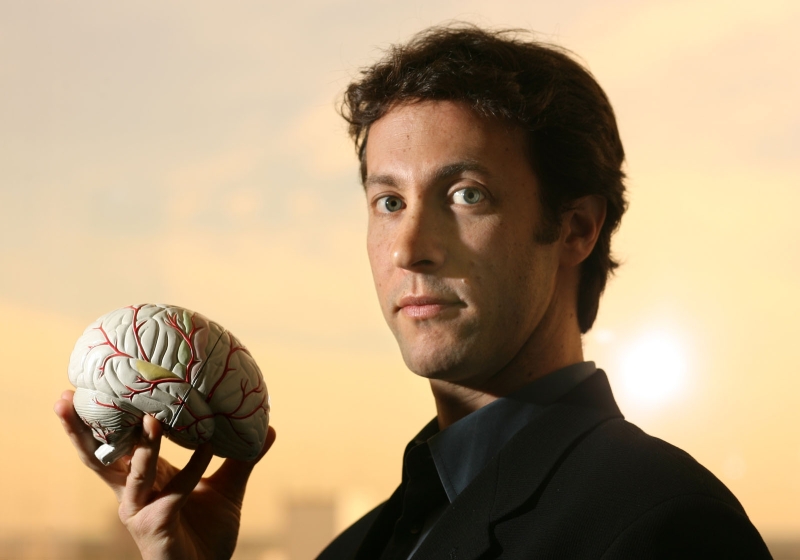On neuroscience and polytheism
 In the old, old days, the ancients understood that we had many different ruling systems in our brains. They called this polytheism. The Greeks, for example, knew that humans were swung this way and that by a rowdy assembly of competing impulses, which they called Olympus. Human autonomy could be easily over-powered by these unruly gods. Take the example of Ajax, who massacred a flock of sheep while under Athena’s spell. Despite this weak autonomy, humans still had to 'own' their actions: Ajax kills himself out of shame when he realizes what ‘he’ has done.
In the old, old days, the ancients understood that we had many different ruling systems in our brains. They called this polytheism. The Greeks, for example, knew that humans were swung this way and that by a rowdy assembly of competing impulses, which they called Olympus. Human autonomy could be easily over-powered by these unruly gods. Take the example of Ajax, who massacred a flock of sheep while under Athena’s spell. Despite this weak autonomy, humans still had to 'own' their actions: Ajax kills himself out of shame when he realizes what ‘he’ has done.
This polytheistic, tragic conception of the self changed with the emergence of rational philosophy in the fifth century BC. From Socrates on, philosophers argued that humans could learn to govern themselves using their reason. They could become ‘masters of themselves’, ‘captains of their soul’, and so on. Through rational philosophy, humans could learn to shape their thoughts and actions into a coherent rational plan. They could make their minds a ‘fortress’ against their unruly passions and impulses. Then, no god, demon, djinn or spirit could invade their self or sway them. “The robber of your free will does not exist”, says the Stoic philosopher Epictetus.
In the place of the rowdy pantheon of the gods, philosophy worshipped one god - Zeus, the Logos, sovereign reason. When you serve your reason and develop it, you create a coherent, rational, unified self. But without philosophical training, Plato suggested in The Republic, your self would remain in a state of civil war, a failed state, a state without a coherent government.
The idea of the sovereign, rational self who could be held responsible for its actions passed from ancient philosophy into Christianity, Islam, and eventually into modern liberalism, via Descartes, Kant, Smith and others. Liberalism enthroned what the philosopher Charles Taylor has called the ‘buffered self’ - the rational, autonomous, sovereign self which cannot be invaded by spirits, demons, gods or djinns, like poor old Ajax.
Today, neuroscience is returning us to a polytheistic conception of the self. It is recognizing the extent to which the self is ruled by many different centres, which compete for dominance and often know little of each other.
For example, the neuroscientist Michael Gazzaniga, through his studies of split-brain patients, has built up a lot of evidence to suggest that the two hemispheres of the brain operate independently of each other in very different ways. We may think the Zeus of our reason is in charge, but in fact, Gazzaniga suggests that reason plays a bit role, and it’s really the Hera of our intuitive right hemisphere that calls the shots, while our reasoning left hemisphere merely interprets and justifies these unconscious, automatic decisions - after they have already happened.
The social psychologist John Bargh, meanwhile, has shown through a long series of experiments the extent to which humans respond unconsciously and automatically to subliminal cues in our environment. He told me in an interview: “99% of what we do happens unconsciously and automatically. The problem is this idea that we have free will, that we’re masters of our soul.”
 David Eagleman, in his new book Incognito, likewise suggests we are at the mercy of our competing, unconscious neurological processes. Something physical happens in our brains, and it can completely transform who we ‘are’. Eagleman gives the tragic example of Charles Whitman, a soldier and family man, who one day, out of the blue, climbed the clock tower at the University of Texas and shot 48 people, killing 16 of them. In his suicide note, Whitman asked that scientists operate on his brain to discover what it was that was driving him to behave in this way - they discovered he had a large tumour in his brain. So can we hold Whitman accountable? Can we hold any of us accountable for our actions, if they’re mainly unconscious and automatic?
David Eagleman, in his new book Incognito, likewise suggests we are at the mercy of our competing, unconscious neurological processes. Something physical happens in our brains, and it can completely transform who we ‘are’. Eagleman gives the tragic example of Charles Whitman, a soldier and family man, who one day, out of the blue, climbed the clock tower at the University of Texas and shot 48 people, killing 16 of them. In his suicide note, Whitman asked that scientists operate on his brain to discover what it was that was driving him to behave in this way - they discovered he had a large tumour in his brain. So can we hold Whitman accountable? Can we hold any of us accountable for our actions, if they’re mainly unconscious and automatic?
The ancients’ idea that we can become ‘captains of our soul’ would seem to be up the creek without a paddle. And yet...We should remind ourselves that ancient philosophers didn’t say we were all born free, rational, moral and unified selves. They said we might perhaps become so, but only after years and years of training in mindfulness, self-examination, deliberative reasoning and impulse control. Most of us won’t put ourselves through this training, and will remain in a state of “civil war”, as Plato put it, with the multiple parts of our psyche constantly competing for power.
I think this nuanced conception of human freedom, morality and rationality - as a latent capacity that can be developed through training - still holds up to scientific scrutiny.
For example, if we’re completely determined by our unconscious, automatic impulses, then how come people are able to re-programme themselves to overcome, for example, depression or alcoholism or social anxiety or other chronic emotional disorders? There are many scientific trials which show people can re-programme themselves and change their neural activity, using the techniques of rational Socratic self-examination and impulse control which cognitive therapy took from ancient Greek philosophy. It’s hard work - but it does seem we can occasionally use our conscious reason to re-wire our neurology.
Likewise, behavioural economics might challenge the idea in classical economics that humans are ‘rational consumers’ - but the field still embraces the idea that we can learn to become more rational, disciplined and conscious in our decisions, if we learn to guard against ourselves, just as the ancients suggested we should.
One can over-emphasize the extent to which our behaviour is automatic and unconscious. Psychologists increasingly recognize that, in the words of UCLA neuroscientist Matt Lieberman, “consciousness may only account for 1% of human behaviour, but that 1% accounts for pretty much everything of interest that humans do”.
Indeed, a recent paper by Baumeister, Vohs and Masicampo in the Annual Review of Psychology, called Do Conscious Thoughts Cause Behaviour, looked through the experimental literature and decided conscious thoughts do play an important role in human behaviour, particularly in interpreting past events, planning future events, logical reasoning, maths, goal-setting, impulse control, and taking other people’s perspective. The authors decided that “when a person has multiple motivations that produce competing, incompatible impulses, consciousness may help decide which takes precedence”. So Zeus would appear to have a role in Olympus after all.
These findings have been broadly accepted by psychologists, including by Eagleman, who is presently researching how humans can improve their conscious impulse-control through training. He’s shown how smokers can be trained to resist the automatic impulse to smoke, and wants to see if this can work with criminals, who often complain that, like Ajax, they didn’t want to do what they ended up doing.
It seems to me that modern psychology and neuroscience, far from challenging the basic assumptions of ancient philosophy, are actually affirming them. We’re not born free, rational, moral and unified creatures. On the contrary, we’re a riot of competing unconscious impulses. But we might perhaps be able to become slightly more free, more rational, more self-controlled and more moral through philosophical training. And in that ‘more’ lies all our hope for freedom, dignity, and happiness.
